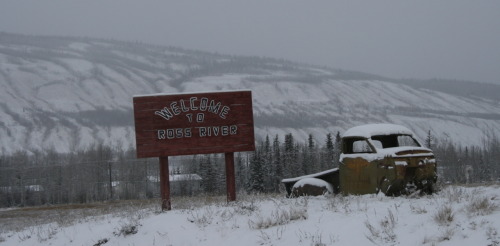
Ross River has a vision for the future and is seeking solutions and strategies to overcome key barriers for people with disabilities and contributing social conditions.
KEY CONCEPTS: change through education and training; inter-generational social deprivation and disabilities; coordinated strategic planning; links to Whitehorse agencies
Ross River might be small and tucked away in the heart of Yukon, but it has access to an array of economic and community development opportunities, including natural resources exploration and extraction, tourism, and infrastructure development.
With a number of mines operating in the area, accessible by road and fly-in only, Ross River is prospectively the hub for services for a wide range of business enterprises, not least the Dena Council and the ambitions of its development corporation.
Neighbouring Faro, a short 1 hour drive in the direction of Carmacks and the main highway north and south, is a full service town, providing additional services and human resources in support of innovative social and business enterprise.
Like other Yukon towns of similar size and distance from Whitehorse, Ross River has significant disabilities issues that remain unresolved and continue to limit the community’s and First Nation’s plans for growth and development.
Fetal Alcohol Spectrum Disorder (FASD), drug and alcohol additions, mental health issues, and learning disabilities were identified as the predominant disabilities within the community. The social conditions associated with risk for FASD has resulted in inter-generational disabilities issues; a cause for concern that is by no means unique to Ross River, but one that the leadership of this community are committed to tackling, head-on.
The Dena Council is recognizably the leading employer of people with disabilities in the community. Like other First Nations, there is a commitment to support friends, family, and neighbours as both a responsible employer and government. To this end, significant efforts are made to hire and retain people with disabilities. Making progress is difficult, however, without a coordinated support network and direct links to key disabilities agencies based in Whitehorse.
Our meetings in Ross River helped us to understand the specific needs of this community and its ambitions to make important progress. Essential in piecing together a sustainable solution for the community are quality, sustained employment-skills-education-training services. This could include everything from life-skills workshops, readiness-to-work supports, job coaching and on-the-job mentoring through to provision of fully accessible foundation skills courses in reading, writing and math, and education/career programs that lead to qualifications from everything from trades to business administration and leadership.
We were inspired by the resiliency of Ross River and its people, made possible, in part, by the ongoing efforts of the education and health providers, working to bring essential services and enable efforts to support pathways to employment for people with disabilities.
We look forward to extending and expanding disability support services through a Yukon Disability Employment Strategy, maximizing the benefits of opportunities for progressive change ahead.
